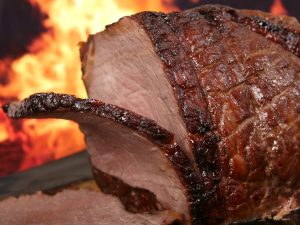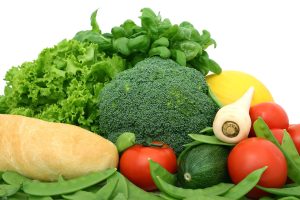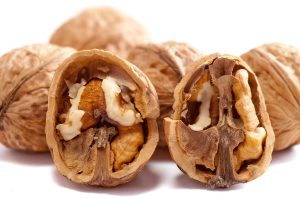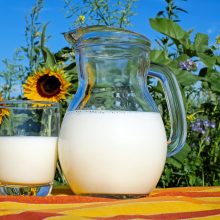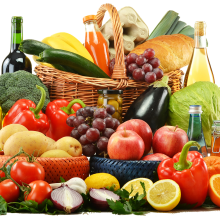Protein Does A Body Good (But How Much Should You Be Eating?)
Protein is one of the body’s fundamental building blocks, but do you truly understand the ins and outs of this critical nutrient?
Thousands of different proteins comprise your body including enzymes, antibodies, messengers, transporters, and structural components. They do a body good performing a vast array of functions like DNA synthesis, oxygen transport, tissue structure, sending nerve impulses, metabolizing nutrients, and regulating hormones.
No bodily process occurs without proteins playing a part!
But then questions arise. What happens if you consume too much protein? Or what about not eating enough protein?
Based on articles I’ve read over the years, I always thought it was important to eat plenty of protein to keep my body strong and healthy.
So I consumed whey protein shakes daily and ate lots of meat.
Then I read something recently that shocked me.
Dr. Steven R. Gundry wrote in his book The Plant Paradox that eating too much protein is bad for your body. He cited another doctor who agreed with him, Dr. Valter Longo of the Longevity Institute at the University of Southern California.
Gundry and Longo attest that people require only 0.37 grams of protein per kilogram of body weight. Since a kilogram equals 2.2 pounds, a 150-pound man would only need about 25 grams of protein daily, and a 125-pound woman about 21 grams.
The protein shakes alone that I drank had 25 grams of protein. Add in the meat and I was exceeding their protein intake by at least double.
Or, as Gundry attests, maybe more than double.
Dr. Gundry went on to say that their “calculations do not consider that every day we recycle about 20 grams of our own protein that has sloughed from our intestines and mucus. In other words, both mucus and your gut lining cells contain protein . . . which we digest in our gut.”
And even if you didn’t eat meat, Dr. Gundry says you also get protein from lots of other foods . . . such as eggs, cheese, nuts, and even vegetables. He writes, “Half a cup of steamed cauliflower supplies 1 gram of protein; a medium baked sweet potato, 2 grams; and an artichoke about 4 grams.”
As you can see, considering all that we eat, the protein can add up quickly putting us over our daily recommended limit recommended by Drs. Gundry and Longo.
The Protein Conundrum: More or Less?
It’s a known fact that consuming too much protein can harm the body. And so can too little protein.
So how much protein should a person consume to maintain good health and muscle strength?
The answer – opinions vary among experts. This variance in opinions can leave individuals perplexed about the ideal amount of protein to incorporate into their diets.
As we pointed out, Drs. Longo and Gundry emphasize a conservative approach to protein consumption. On the other hand, some nutritionists argue for higher daily protein intake.
The government’s Recommended Dietary Allowance (RDA) also differs from what Drs. Longo and Gundry recommend. For men and women, the government says the RDA for protein is approximately 0.8 grams per kilogram of body weight. Or expressed in pounds, the RDA says men and women need 0.36 grams of protein per pound.
If you follow the RDA guidelines, a person weighing 150 pounds would need around 55 grams of protein per day. Or a little more than double what Gundry and Longo contend.
If you’re an athlete or someone who engages in regular exercise, you may require more protein to support muscle repair and growth. Studies have shown that exercise can increase daily protein needs relative to sedentary individuals.
For example, the International Society of Sports Nutrition suggests that active individuals may need approximately 1.4 to 2.0 grams of protein per kilogram of body weight.
So how do we navigate through the conflicting advice on protein intake? The key lies in understanding individual needs, activity levels, and health goals.
To find out what works best for you, it’s best to consult with a nutritionist or healthcare provider to provide personalized insights tailored to your specific requirements.
Adults, especially seniors, should check with their doctor to take a simple blood test. This can determine whether you’re getting enough, too much, or not enough protein in your diet.
Plant-Based Proteins vs. Animal-Based Proteins
Another question that comes up is which is better – plant-based protein or animal-based protein?
When it comes to choosing between animal protein and plant-based protein, the decision often boils down to personal preferences, dietary restrictions, and health goals.
To help in choosing between the two types of protein you need to be aware of the unique health benefits and drawbacks of each type of protein.
Let’s dive into a nutritional comparison and explore the health impacts of each protein source.
Plant-Based Proteins:
Benefits:
- Much lower in saturated fat and zero cholesterol
- Rich in beneficial fibers, antioxidants, and phytochemicals
- May reduce risk for some cancers and heart disease
Drawbacks:
- Often lower in one or more essential amino acids. To offset this deficiency, you would need to consume a variety of plant-based protein sources.
- Contains fewer vitamins B12 and D.
- Slower digesting may limit muscle protein synthesis compared to animal sources.
- Some plant-based proteins are high in carbohydrates, which may be bad for individuals following a low-carb diet.
Sources:
- Legumes such as lentils, chickpeas, tofu, and black beans are excellent plant-based protein sources.
- Whole grains like quinoa and brown rice provide not only protein but also essential vitamins and minerals.
- Nuts and seeds like walnuts, chia seeds, and hemp seeds offer a nutrient-dense protein boost.
Animal-Based Proteins:
Benefits:
- Animal-based proteins are complete proteins containing all essential amino acids required by the body. These proteins are highly bioavailable, meaning they are easily absorbed and utilized by the body for various functions like muscle repair and hormone production.
- Highly bioavailable and rapid digesting.
- Provides more vitamin B12
- They are rich in heme iron, which is more readily absorbed by the body compared to non-heme iron sources.
Drawbacks:
- Animal proteins can also be high in saturated fats and cholesterol leading to potential risks for heart health if consumed excessively.
- Has arachidonic acid linked to inflammation
- May contain carcinogens like heme iron when overcooked
Sources:
- Lean meats such as poultry, fish, and lean cuts of beef are great sources of animal-based proteins.
- Dairy products like Greek yogurt and cottage cheese offer a convenient way to meet protein needs.
Drs. Gundry and Shallenberger emphasize the importance of consuming quality protein sources for optimal health. They advocate a balanced approach to protein intake, encouraging individuals to consume a variety of animal and plant-based proteins to meet their nutritional needs effectively.
Evidence from studies like the long-term Nurses’ Health Study sheds light on the impact of different protein sources on health. This research compared the effects of meat/dairy protein versus plant-based protein consumption.
The Study’s findings showed that while animal proteins can be rich in essential nutrients, excessive intake may lead to adverse health effects. For instance, this study found swapping just 3% of calories from animal protein for plant protein significantly decreased early death risk. Replacing beef with nuts offered the most benefit.
On the other hand, plant-based proteins, when consumed in larger volumes, provide a good source of essential nutrients without adverse health effects. When participants in the study replaced meat or dairy protein with plant-based protein, the data showed that they were more likely to experience good physical function, good mental health, and an absence of chronic disease in later years.
What Happens When You Don’t Eat Enough Protein?
Consuming adequate protein is essential for maintaining and repairing structural and functional components throughout the body. Protein provides amino acids that are the building blocks for muscles, bones, skin, hair, hormones, neurotransmitters, genetic material, enzymes, antibodies, and transport molecules.
When you don’t get enough protein to meet your daily needs, your body breaks down its own muscle, bone, and organ tissues to harvest amino acids. This leads to undesirable effects:
- Loss of muscle mass and strength
- Impaired immunity and more frequent illnesses
- Delayed wound healing and recovery from injury
- Bone weakness and increased fracture risk
- Higher risk of falls
- Fluid retention and swelling (edema)
- Fatigue, low energy, and exhaustion
- Nutrient deficiencies which can result in inflammation and oxidative stress
Older adults need to ensure they are getting enough protein to support their muscle health, body composition, and overall well-being. The recommended protein intake for older adults is higher than the general population, with suggestions ranging from 1 to 1.5 grams of protein per kilogram (2.2 pounds) of body weight per day.
How Do Protein Needs Change As We Age?
Research shows that aging causes substantial changes in how dietary protein is metabolized and used by the body. Protein synthesis, or the creation of new proteins from amino acids we eat, declines significantly as adults get older.
Starting around age 40, the anabolic resistance of aging manifests. Muscles become less efficient at assimilating and utilizing protein to maintain mass. This leads to age-related loss of muscle and strength if protein intake is not increased.
Reasons for these age-related changes include:
- Reduced production of hormones like testosterone and IGF-1 vital for muscle growth
- Blunted stimulation of muscle protein synthesis in response to food intake
- Altered absorption rates of amino acids
- Increased muscle breakdown between meals
To help counteract these effects, research suggests older adults should aim for 25-30% higher protein intake compared to younger adults. Seniors also benefit by spreading protein consumption evenly throughout the day and combining resistance exercise with higher protein meals to maximize anabolic effects, i.e., muscle growth and repair. Resistance exercise includes the use of weights, machines, bodyweight exercises, and resistance bands.
How Excess Protein Can Hurt You?
Most people perceive protein as universally beneficial. However, routinely exceeding one’s daily needs long-term may come with some risks according to emerging research.
So what can happen if you consume too much protein? Let’s take a look . . .
- Liver and kidney strain – Excess protein elevates ammonia production as a byproduct. Clearing high ammonia burdens the kidneys and liver which can worse problems if these organs are already compromised.
- Leaching of calcium – Metabolizing high protein requires more acid-base buffering which may promote calcium excretion through the urine and increase risk for osteoporosis.
- Intestinal inflammation – Diets with substantial animal protein tend to also contain less fiber and more fat which can promote inflammatory gut conditions.
- Cancer concerns – Some epidemiological data links diets very high in red meat protein intake with increased cancer risk, especially gastrointestinal and prostate cancers.
- Dehydration – Processing excess protein demands more fluid which may lead to dehydration if intake is insufficient. Greater fluid losses also place a strain on the kidneys.
- Weight gain – Despite myths that more protein equates to more weight loss, eating surplus protein beyond needs may contribute to fat creation and weight gain over time.
Note: Athletes and active younger adults can generally tolerate higher protein intakes without issue. However, seniors and those with existing kidney dysfunction are more prone to adverse effects from overconsuming protein.
Protein Perfection: Finding Your Balance for Better Health
Incorporating a variety of protein sources into your diet can help you meet your body’ essential nutrient needs and promote overall health and vitality. Remember: balance is key.
By understanding the importance of protein, choosing quality sources, diversifying your protein sources from a variety of plant-based and animal-based proteins to creating a balanced and nutritious diet, and consuming it in moderation, you can harness its transformative power to achieve optimal health and vitality for years to come.
Protein is an essential nutrient that plays a central role in supporting overall health and well-being. So, when planning your meals, think about how you can include protein-rich foods to fuel your body and set yourself up for success in achieving your health and wellness goals.
Your body will thank you for it!

